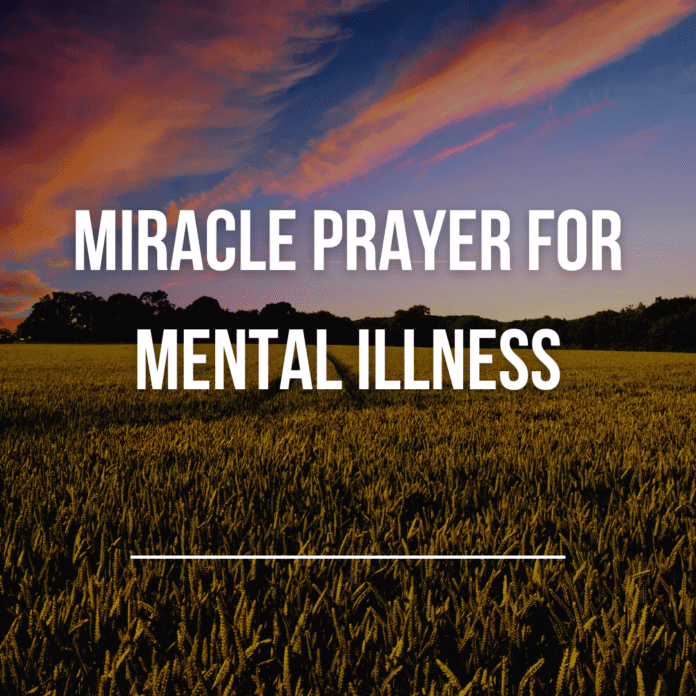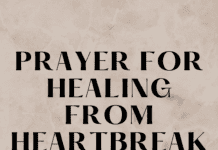Today we will be dealing Miracle Prayer for Mental Illness. If you or a loved one is struggling with mental illness, you may be searching for a solution that goes beyond medication and therapy. One possible option is the use of prayer. Many people believe in the power of prayer to heal not just physical ailments, but also mental and emotional ones. In fact, there are numerous accounts of individuals who have experienced relief from symptoms of mental illness through prayer.

One particular type of prayer that has gained popularity in recent years is the “miracle prayer” for mental illness. This prayer is based on the idea that with faith and persistence, anything is possible. It involves asking for divine intervention and healing, and trusting that the God will provide the necessary support and guidance. While the effectiveness of this prayer may vary from person to person, some individuals have reported significant improvements in their mental health after incorporating it into their daily routine.
It’s important to note that prayer should never be used as a substitute for professional medical treatment. If you or a loved one is struggling with mental illness, it’s crucial to seek the guidance of a qualified mental health professional. However, if you are interested in exploring the potential benefits of prayer as a complementary form of treatment, the miracle prayer for mental illness may be worth considering.
Understanding Mental Illness

Mental illness is a condition that affects a person’s thinking, feeling, mood, and behavior. It can be caused by a variety of factors, including genetics, environment, and life experiences. Mental illness can range from mild to severe and can affect people of all ages and backgrounds.
Types of Mental Illness
There are many different types of mental illness, each with its own set of symptoms and treatments. Some common types of mental illness include:
- Depression
- Anxiety disorders
- Bipolar disorder
- Schizophrenia
- Obsessive-compulsive disorder (OCD)
- Post-traumatic stress disorder (PTSD)
Common Symptoms
The symptoms of mental illness can vary depending on the type of illness and the individual. Some common symptoms include:
- Feelings of sadness or hopelessness
- Anxiety or panic attacks
- Mood swings
- Delusions or hallucinations
- Difficulty sleeping
- Changes in appetite or weight
- Difficulty concentrating or making decisions
- Fatigue or loss of energy
Impact on Daily Life
Mental illness can have a significant impact on a person’s daily life. It can affect their ability to work, attend school, maintain relationships, and participate in everyday activities. It can also lead to physical health problems and an increased risk of suicide.
It is important to seek help if you or someone you know is experiencing symptoms of mental illness. Treatment options include therapy, medication, and support groups. With the right treatment and support, people with mental illness can lead fulfilling and productive lives.
The Role of Faith in Healing

When it comes to mental illness, faith can play a significant role in the healing process. Prayer, meditation, and spiritual support can provide comfort, hope, and a sense of purpose to those struggling with mental health issues.
Spiritual Support
Many people find comfort in turning to their faith during difficult times. Churches, synagogues can provide a community of support, where individuals can connect with others who share their beliefs and experiences. Pastors, priests, rabbis, and other spiritual leaders can offer guidance, counseling, and prayer to those in need.
In summary, faith can play a valuable role in the healing process for those struggling with mental illness. Spiritual support and prayer can provide comfort and a sense of purpose, but should not be seen as a replacement for medical treatment.
Components of a Miracle Prayer

When it comes to praying for mental illness healing, a miracle prayer can be a powerful tool. But what exactly makes a prayer “miraculous”? There are a few key components that can help make your prayer more effective.
Setting Intentions
One important component of a miracle prayer is setting clear intentions. Before you begin praying, take some time to reflect on what you hope to achieve through your prayer. What specific outcome are you hoping for? Are you praying for yourself or for someone else? Being clear about your intentions can help you focus your prayer and give it more power.
Words of Affirmation
Another important component of a miracle prayer is using words of affirmation. Positive affirmations can help you shift your mindset and focus on the positive aspects of your situation. When you’re praying for mental illness healing, it can be helpful to use affirmations that focus on health, strength, and resilience. For example, you might say something like, “I am strong and capable of overcoming this challenge,” or “I have the power to heal my mind and body.”
By incorporating these components into your miracle prayer, you can increase its effectiveness and improve your chances of achieving the outcome you desire. Remember to stay focused, stay positive, and trust in the power of your prayer.
Praying for Self-Healing
When it comes to mental illness, prayer can be a powerful tool for self-healing. By turning to a higher power, you can find comfort, guidance, and strength to overcome the challenges that come with mental health struggles. Here are two ways you can incorporate prayer into your self-healing journey:
Self-Compassion in Prayer
Prayer can be an opportunity to practice self-compassion and self-love. Instead of focusing on your shortcomings or perceived flaws, use prayer to remind yourself of your inherent worth and value. You can start by acknowledging your struggles and asking for divine guidance and support. Then, focus on affirming your positive qualities and strengths. For example, you could say a prayer like this:
“Dear God, I come to you today seeking your guidance and support as I navigate my mental health journey. Please help me to see my worth and value, even in my struggles. I affirm that I am strong, resilient, and capable of overcoming any obstacle. Thank you for your love and grace. Amen.”
Affirmative Prayers for Self
Affirmative prayers are another way to incorporate prayer into your self-healing practice. These prayers focus on positive affirmations and visualizations, helping you to manifest the healing and transformation you desire. You can start by identifying the specific areas of your mental health that you want to improve. Then, create an affirmative prayer that affirms your desired outcome. For example, you could say a prayer like this:
“Dear God, I affirm that I am healed and whole in mind, body, and spirit. I release any negative thoughts or beliefs that are holding me back from experiencing true peace and joy. I visualize myself living a life of abundance, happiness, and fulfillment. Thank you for your love and blessings. Amen.”
By incorporating prayer into your self-healing journey, you can tap into the power of the divine to overcome mental health challenges and find greater peace and fulfillment in your life.
Praying for Others
As you continue to pray for yourself, it is equally important to pray for others who may be struggling with mental illness. Intercessory prayer is a powerful tool that allows you to pray on behalf of someone else. It is a selfless act of love and compassion that can bring comfort and healing to those in need.
Intercessory Prayer
Intercessory prayer involves praying for others who may not have the strength or ability to pray for themselves. When you pray for someone else, you are asking God to intervene in their lives and provide them with the support and guidance they need. This can be especially helpful for those who are dealing with mental illness, as it can be difficult for them to find the words or motivation to pray on their own.
When praying for someone else, it is important to be specific in your requests. Ask God to provide them with the strength and courage to overcome their struggles, and to guide them towards the resources and support they need. You can also ask for God’s protection and peace to surround them as they navigate their journey towards healing.
Collective Prayer Efforts
In addition to intercessory prayer, collective prayer efforts can also be a powerful tool in supporting those with mental illness. This involves coming together with others to pray for a common goal or intention. Whether it’s through a prayer group, church service, or online community, collective prayer can create a sense of unity and support for those who may feel alone in their struggles.
When participating in collective prayer efforts, it is important to remain open-minded and respectful of others’ beliefs and experiences. Remember that everyone’s journey towards healing is unique, and there is no one-size-fits-all approach to mental health. By coming together in prayer, we can create a supportive and compassionate environment for those in need.
In conclusion, praying for others can be a powerful way to support those with mental illness. Whether through intercessory prayer or collective prayer efforts, we can create a sense of unity and compassion that can bring comfort and healing to those who need it most.
Creating a Prayer Routine
Prayer can be a powerful tool in managing mental illness. By incorporating prayer into your daily routine, you can find comfort and peace. Here are some tips for creating a prayer routine:
Daily Prayer Times
Setting aside specific times each day for prayer can help you establish a routine. Consider starting your day with a morning prayer, taking a few minutes during your lunch break to pray, and ending your day with an evening prayer.
You may also want to consider incorporating prayer into your daily activities. For example, you can pray while taking a walk or while doing household chores. By making prayer a part of your daily routine, you can experience the benefits of consistent prayer.
Prayer Journaling
Keeping a prayer journal can be a helpful way to track your prayers and reflect on your spiritual journey. You can use your journal to write down your prayers, reflect on answered prayers, and record any insights you gain through prayer.
In addition to helping you stay organized and focused in your prayer life, journaling can also provide a sense of accountability. By reviewing your journal regularly, you can see how your prayers are being answered and track your spiritual growth over time.
Remember, prayer is a personal and individual practice. There is no right or wrong way to pray, and everyone’s prayer routine will look different. By finding a routine that works for you, you can experience the benefits of prayer in managing your mental health.
Community Support and Resources
If you or someone you know is struggling with mental illness, it’s important to know that you are not alone. There are many community support and resources available to help you manage your condition and improve your quality of life.
Support Groups
Support groups can be a valuable resource for those struggling with mental illness. They provide a safe and supportive environment where individuals can share their experiences, learn from others, and receive emotional support. Many support groups are free and open to the public, and they can be found through local mental health organizations, hospitals, and community centers.
Professional Help and Counseling
In addition to support groups, professional help and counseling can also be beneficial for those struggling with mental illness. Mental health professionals, such as psychiatrists, psychologists, and licensed therapists, can provide a range of services including diagnosis, medication management, and therapy. It’s important to find a mental health professional who is experienced in treating your specific condition and who you feel comfortable working with.
Overall, community support and resources can be an important part of managing mental illness. Whether it’s through support groups or professional help, there are many options available to help you on your journey towards recovery.
Miracle Prayer for Mental Illness
- Heavenly Father, we lift those battling mental illness into Your caring hands. May your comforting presence bring peace, dispelling the darkness within their minds. In the name of Jesus Christ.
- Lord, grant strength to those feeling overwhelmed by anxiety and depression. Shower them with courage to face each day, knowing Your love surpasses all trials. In the name of Jesus Christ.
- Merciful Savior, touch the hearts of those struggling with bipolar disorder. Bring stability to their emotions and surround them with understanding and support. In the name of Jesus Christ.
- Compassionate God, heal the minds of those grappling with schizophrenia. Let Your soothing grace be a balm, restoring clarity and dispelling confusion. In the name of Jesus Christ.
- Almighty Physician, we entrust those facing PTSD into Your hands. Heal the wounds of their past, replace fear with peace, and guide them towards emotional restoration. In the name of Jesus Christ.
- Loving God, uplift those combating eating disorders. Grant them the strength to break free from destructive patterns, embracing a healthy and nourishing relationship with their bodies. In the name of Jesus Christ.
- Prince of Peace, blanket those in the grip of obsessive-compulsive disorder with Your calming presence. Replace distressing thoughts with Your truth and serenity. In the name of Jesus Christ.
- Gracious Lord, soothe the minds of those battling addiction. Break the chains of dependency, replacing emptiness with Your love and purpose. In the name of Jesus Christ.
- Divine Comforter, envelop those facing postpartum depression with Your tender care. Bring healing to their hearts, fostering a sense of joy and fulfillment in motherhood. In the name of Jesus Christ.
- God of Hope, shine Your light upon those wrestling with self-harm tendencies. Transform their pain into strength and guide them towards healthier coping mechanisms. In the name of Jesus Christ.
- Heavenly Healer, release those held captive by anxiety disorders. Grant them the assurance of Your unwavering presence, casting out fear and ushering in tranquility. In the name of Jesus Christ.
- Lord of Compassion, mend the fractured minds of those struggling with dissociative disorders. Reintegrate their thoughts, restoring a sense of wholeness and stability. In the name of Jesus Christ.
- Everlasting Father, comfort those in the throes of grief-related depression. Surround them with Your love, providing solace as they navigate the complexities of loss. In the name of Jesus Christ.
- Mighty Deliverer, break the chains of depression that bind Your children. Infuse them with Your joy and purpose, dispelling the shadows that obscure their inner light. In the name of Jesus Christ.
- Divine Counselor, guide those with attention-deficit disorders. Sharpen their focus, grant them clarity of thought, and instill a sense of purpose in their daily endeavors. In the name of Jesus Christ.
- Compassionate Redeemer, free those struggling with personality disorders from the weight of distorted perceptions. Replace confusion with truth and lead them to emotional healing. In the name of Jesus Christ.
- God of Comfort, bring serenity to the minds of those wrestling with chronic anxiety. Grant them a respite from worry, filling their hearts with Your peace. In the name of Jesus Christ.
- Sovereign Lord, break the chains of addiction to destructive thought patterns. Empower those trapped in negative cycles to embrace Your renewing grace. In the name of Jesus Christ.
- Loving Shepherd, guide those facing mental health challenges to green pastures of healing. Lead them beside still waters, restoring their souls with Your comforting touch. In the name of Jesus Christ.
- Almighty God, we lift up those with suicidal thoughts. Surround them with Your protective love, grant them hope, and empower them to find purpose in Your divine plan. In the name of Jesus Christ.














